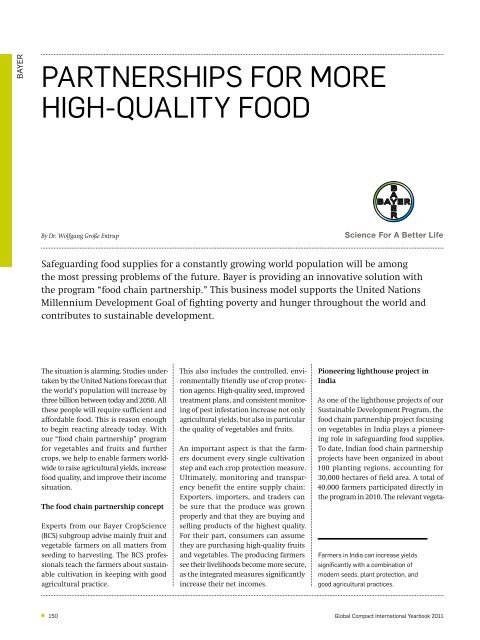Global Compact International Yearbook Ausgabe 2011
Over the last several years, the United Nations has become a trailblazer in promoting corporate responsibility. “In the 11 years since its launch, the United Nations Global Compact has been at the forefront of the UN’s effort to make the private sector a critical actor in advancing sustainability,” UN Secretary-General Ban Ki-moon says in the 2011 edition of the Global Compact International Yearbook. Edited by the German publishing house macondo, the new Yearbook offers insights on political as well as sustainability issues. Exemplary entrepreneurial commitments can foster and create incentives for other companies. To guide companies along this road, they need a blueprint for corporate sustainability. This is the focal topic of the new Global Compact International Yearbook. Guidelines for consumer standards and labels, an analysis of the new ISO 26000 SR Standard, and a debate about the historic changes in the Arab world are other major topics explored. Among this year’s prominent authors are Lord Michael Hastings, NGO activist Sasha Courville, and the former Director-General of the United Nations Office at Geneva, Sergei A. Ordzhonikidze.
Over the last several years, the United Nations has become a trailblazer in promoting corporate responsibility. “In the 11 years since its launch, the United Nations Global Compact has been at the forefront of the UN’s effort to make the private sector a critical actor in advancing sustainability,” UN Secretary-General Ban Ki-moon says in the 2011 edition of the Global Compact International Yearbook. Edited by the German publishing house macondo, the new Yearbook offers insights on political as well as sustainability issues.
Exemplary entrepreneurial commitments can foster and create incentives for other companies. To guide companies along this road, they need a blueprint for corporate sustainability. This is the focal topic of the new Global Compact International Yearbook. Guidelines for consumer standards and labels, an analysis of the new ISO 26000 SR Standard, and a debate about the historic changes in the Arab world are other major topics explored. Among this year’s prominent authors are Lord Michael Hastings, NGO activist Sasha Courville, and the former Director-General of the United Nations Office at Geneva, Sergei A. Ordzhonikidze.
You also want an ePaper? Increase the reach of your titles
YUMPU automatically turns print PDFs into web optimized ePapers that Google loves.
Best Practice<br />
Development<br />
Bayer<br />
Partnerships for More<br />
High-Quality Food<br />
By Dr. Wolfgang Große Entrup<br />
Safeguarding food supplies for a constantly growing world population will be among<br />
the most pressing problems of the future. Bayer is providing an innovative solution with<br />
the program “food chain partnership.” This business model supports the United Nations<br />
Millennium Development Goal of fighting poverty and hunger throughout the world and<br />
contributes to sustainable development.<br />
The situation is alarming. Studies undertaken<br />
by the United Nations forecast that<br />
the world’s population will increase by<br />
three billion between today and 2050. All<br />
these people will require sufficient and<br />
affordable food. This is reason enough<br />
to begin reacting already today. With<br />
our “food chain partnership” program<br />
for vegetables and fruits and further<br />
crops, we help to enable farmers worldwide<br />
to raise agricultural yields, increase<br />
food quality, and improve their income<br />
situation.<br />
The food chain partnership concept<br />
Experts from our Bayer CropScience<br />
(BCS) subgroup advise mainly fruit and<br />
vegetable farmers on all matters from<br />
seeding to harvesting. The BCS professionals<br />
teach the farmers about sustainable<br />
cultivation in keeping with good<br />
agricultural practice.<br />
This also includes the controlled, environmentally<br />
friendly use of crop protection<br />
agents. High-quality seed, improved<br />
treatment plans, and consistent monitoring<br />
of pest infestation increase not only<br />
agricultural yields, but also in particular<br />
the quality of vegetables and fruits.<br />
An important aspect is that the farmers<br />
document every single cultivation<br />
step and each crop protection measure.<br />
Ultimately, monitoring and transparency<br />
benefit the entire supply chain:<br />
Exporters, importers, and traders can<br />
be sure that the produce was grown<br />
properly and that they are buying and<br />
selling products of the highest quality.<br />
For their part, consumers can assume<br />
they are purchasing high-quality fruits<br />
and vegetables. The producing farmers<br />
see their livelihoods become more secure,<br />
as the integrated measures significantly<br />
increase their net incomes.<br />
Pioneering lighthouse project in<br />
India<br />
As one of the lighthouse projects of our<br />
Sustainable Development Program, the<br />
food chain partnership project focusing<br />
on vegetables in India plays a pioneering<br />
role in safeguarding food supplies.<br />
To date, Indian food chain partnership<br />
projects have been organized in about<br />
100 planting regions, accounting for<br />
30,000 hectares of field area. A total of<br />
40,000 farmers participated directly in<br />
the program in 2010. The relevant vegeta-<br />
Farmers in India can increase yields<br />
significantly with a combination of<br />
modern seeds, plant protection, and<br />
good agricultural practices.<br />
150 <strong>Global</strong> <strong>Compact</strong> <strong>International</strong> <strong>Yearbook</strong> <strong>2011</strong> <strong>Global</strong> <strong>Compact</strong> <strong>International</strong> <strong>Yearbook</strong> <strong>2011</strong><br />
151

















